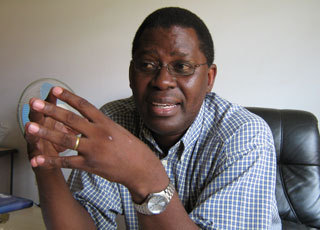
By Patrick Kagenda
As the global financial crisis continues to affect economies worldwide, The Independent’s Patrick Kagenda talked to Gideon Badagawa, Executive Director Uganda Manufacturers Association on how it is affecting Uganda’s manufacturing sector.
How will the global financial crisis affect Uganda?
Uganda cannot escape the global economic crisis. There are things we need to fix in the country to make it at least a little bit more comfortable for the investors. If the international price of oil has gone down and we still see high pump prices, then the explanation goes to the constrained transportation especially between Kampala and Mombasa.
This does not mean that government has not done a lot to add to the available power. So those two aspects, relating to the global crisis are quite a challenge to the business community in the country; fuel and power. Also, if we do not rush to fix our transport infrastructure from here to Mombasa, we are likely to increase even further the cost of production and therefore inflation which now is in double digits. We are talking of 14 percent way up from 8 percent a few months ago. If we are going to have billions of dollars pumped into the motor industry in the US and Europe, then there are questions over whether we are going to have more of this 30 percent aid to support our infrastructural development. We need to improve and widen our own tax base.
Have you had manufacturers pull out because of the reasons you have mentioned?
Yes, especially as a result of energy. Some fish companies closed. Maize mills are closing, B.A.T, and BATA. In 2009, there are issues to look at to help the manufacturers and the business community by reducing the cost of doing business. The government should develop infrastructure, improve the regulatory frame works and the commercial law, making sure that the counterfeit bill is passed by Parliament. We also need a mortgage law. We are now moving into the EAC and everyone is talking about fast tracking the integration process through the common market, to the political confederation and so on. We need the national identity card as quickly as possible. We need the insurance policies, construction policies, medical, and the education policy and so on. We are educating so many Kenyans and Tanzanians yet Uganda has the least labour productivity in Africa. There is that gap between what the labour market is looking for, and what the universities are giving out. If you look at AGOA, Uganda has been talking of about US$20 million from AGOA and Kenya is looking at way beyond $200- $240million, yet we are the ones who have actually sung most about AGOA as an opportunity.
Assuming aid does not come and our infrastructure is not improved on, what is likely to happen?
I don’t want to be a prophet of doom, but the obvious is, the investor will always ask about four questions; power, transport infrastructure, cost of labour and communication. Take the fuel example now. Restocking the reserves is a very simple thing. But look at how procurement has played us a game. For all those months, we have not been able to break through. Procurement to and fro, they give the tender to this one and then the other, again.
Throughout the world no country has developed using another countries port. If you look at countries that have developed, they have their own ports and thank God; Uganda is contemplating bringing an inland port. But there is a problem in terms of procurement. You can’t develop without trade and investment. If someone is going to locate his industry in your country, he is asking many questions whether he can access the world markets. One way to do this is to access the port.
Why was Uganda doing much better in the sixties than today?
Remember that the rail infrastructure at that time was super going right up to Kasese, to Nairobi and Mombasa within hours. One would think we would be much better off than we were in the sixties because by then we were talking of 8-9 million people, now you are looking at 30 million people. A fast growing population is a challenge although some politicians don’t regard this as such. No wonder we have environmental pressure coming from economic activities including the industrial sector; toxic waste, solid waste and the polythene bags. We need policies that can help us shape up the economy in 2009. When you go to Korea, China, Japan; they are using this waste to produce energy.
Are you saying the global financial crisis has no effect but our own weaknesses are knocking us off?
If we don’t cushion ourselves we are likely to suffer more than any one else. So, if we fix our infrastructure, we fill mercury our oil reserves; fix our rail line, and feeder roads. You must modernise agriculture to transform industry. We don’t expect a lot of aid but we should not be putting a lot of our focus on what the donors are going to give us because it may not come now given what is happening in Europe, Asia and in the US.
What is the way forward for Uganda?
We must create jobs through investments. The easy way to go is to attract investment, to create employment and generate income if you are going to alleviate and reduce poverty. To be able to create and attract investment you need a climate conducive to investment. Uganda needs to move away from 200MW of electricity to 500 MWs in a space of about a year. The way forward is to have improved infrastructure, roads.
 The Independent Uganda: You get the Truth we Pay the Price
The Independent Uganda: You get the Truth we Pay the Price



